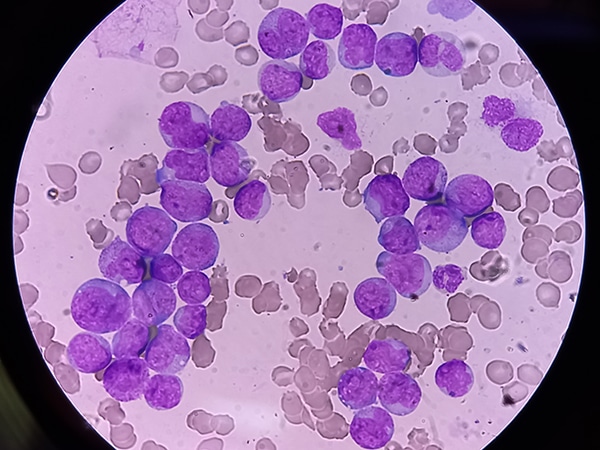New Targeted Therapy Bolsters Standard Treatment for Acute Myeloid Leukemia
The FDA has approved an inhibitor of FLT3 for use across multiple phases of acute myeloid leukemia treatment.
The U.S. Food and Drug Administration (FDA) has approved quizartinib (Vanflyta) for the treatment of patients with newly diagnosed acute myeloid leukemia (AML) whose cancers harbor a FLT3 internal tandem duplication mutation (ITD). Quizartinib was approved as an addition to standard chemotherapy in the induction and consolidation stages of treatment and as a single-agent therapy in the maintenance stage of treatment.

Quizartinib is an inhibitor of the protein FLT3, which is mutated in around 37% of AML cases. The most common FLT3 mutation in AML is an ITD, in which parts of the FLT3 gene get copied several times alongside each other. The mutated FLT3 protein can drive cancer growth, and quizartinib blocks its activity.
A companion diagnostic test to detect FLT3-ITD, called LeukoStrat CDx, was also included in this approval.
Treatment of AML typically occurs in three stages: induction, which eradicates most leukemia cells; consolidation, which kills any remaining cancer cells; and maintenance, given to prevent a recurrence. The chemotherapies cytarabine and anthracycline are commonly used for induction, and cytarabine is commonly used for consolidation. This approval allows for the addition of quizartinib to these treatments for patients with FLT3-ITD. For patients at a high risk of recurrence, quizartinib can also be given by itself as a maintenance therapy.
The approval was based on results from QuANTUM-First, a randomized, double-blind, placebo-controlled, phase III trial in which 539 patients with FLT3-ITD-positive AML were randomly assigned to receive quizartinib or placebo as part of their induction, consolidation, and maintenance regimens. At the time of analysis, patients who received quizartinib had a 22% lower rate of death from any cause than those who received placebo. Patients treated with quizartinib had a median response duration of 38.6 months, compared with 12.4 months among patients treated with placebo.
Quizartinib is not approved as maintenance therapy for patients who received a stem cell transplant as part of consolidation therapy. Quizartinib also includes a boxed warning for certain cardiovascular effects, such as QT prolongation, torsades de pointes, and cardiac arrest.
AML is a cancer of the blood and bone marrow characterized by an overproduction of immature white blood cells. According to federal statistics, it was estimated that 20,380 individuals would be diagnosed with AML and 11,310 patients would die of the disease in the U.S. in 2023.
The FDA rendered its decision on July 20, 2023.
